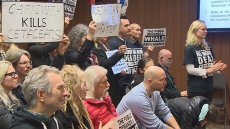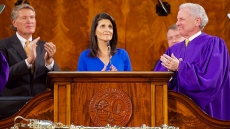US President Donald Trump on Tuesday signed an executive order to revive controversial Keystone XL and Dakota Access oil pipelines.
Trump told reporters that the US "are going to renegotiate some of the terms" of the Keystone XL project.
The Dakota pipeline would be "subject to terms and conditions negotiated by us", he said.
Both projects were blocked by the Obama administration due in part to environmental concerns.
The Keystone XL project was rejected by former President Barack Obama in November 2015 because Democrats and environmental groups complained it could worsen climate change by enabling further growth from oil sands, which created higher greenhouse gas emissions than some other forms of production.
The project, worth $8 billion, was proposed to go from Canada through the US state of Montana and South Dakota to Nebraska, where it would connect with existing pipelines to carry more than 800,000 barrels of crude oil a day to refineries along the US Gulf Coast.
REJECTING KEYSTONE XL CHANCE FOR TRUDEAU TO STAND UP TO TRUMP: MULCAIR

OTTAWA — NDP Leader Tom Mulcair says rejecting the Keystone XL pipeline project would be Prime Minister Justin Trudeau's first opportunity to stand up to newly minted U.S. President Donald Trump.
Trump has moved to advance construction of the Keystone XL and Dakota Access oil pipelines —projects shot down by the previous U.S. administration over environmental concerns.
Mulcair, who is holding his own strategy session with MPs in Ottawa this week, has been unapologetic in his assessments of Trump, calling him "bombastic" and a "fascist."
He calls Keystone a "massive error" for Canada and wonders if Trudeau will approve the project, given the fact the Liberal government has already approved the Kinder Morgan and Line 3 projects.
There has been a silver lining for the NDP in Trump's presidency, however.
The party has long opposed the Trans-Pacific Partnership and Trump's executive order Monday effectively kills the controversial trade deal.
A CHRONOLOGICAL HISTORY OF THE CONTROVERSIAL KEYSTONE XL PIPELINE PROJECT

OTTAWA — A timeline of the controversial Keystone XL pipeline project:
July 2008: TransCanada Corp. (TSX:TRP) and ConocoPhillips, joint owners of the Keystone Pipeline, propose a major extension to the network, dubbed Keystone XL to carry hundreds of thousands of barrels of oilsands bitumen from Alberta to Texas.
2009: As the U.S. State Department wades through comments based on an environmental assessment of the project, TransCanada starts visiting landowners potentially affected by the pipeline. Opposition emerges in Nebraska.
June 2009: TransCanada announces it will buy ConocoPhillips's stake in Keystone.
March 2010: The National Energy Board approves TransCanada’s application for Keystone XL, though the OK comes with 22 conditions regarding safety, environmental protection and landowner rights.
April 2010: The U.S. State Department releases a draft environmental impact statement saying Keystone XL would have a limited effect on the environment.
June-July 2010: Opposition to Keystone XL begins mounting in the United States. Legislators write to then-secretary of state Hillary Clinton calling for greater environmental oversight; scientists begin speaking out against the project; and the Environmental Protection Agency questions the need for the pipeline extension.
July 2010: The State Department extends its review of Keystone, saying federal agencies need more time to weigh in before a final environmental impact assessment can be released.

March 2011: The State Department announces a further delay in its environmental assessment.
Aug. 26, 2011: The State Department releases its final environmental assessment, which reiterates that the pipeline would have a limited environmental impact.
August-September 2011: Protesters stage a two-week campaign of civil disobedience at the White House to speak out against Keystone XL. Police arrest approximately a thousand people, including actors Margot Kidder and Daryl Hannah as well as Canadian activist Naomi Klein.
Sept. 26, 2011: At a demonstration on Parliament Hill, police arrest 117 of 400 protesters.
Nov. 10, 2011: The State Department says TransCanada must reroute Keystone XL to avoid an ecologically sensitive region of Nebraska.
Nov. 14, 2011: TransCanada agrees to reroute the line.
December 2011: U.S. legislators pass a bill with a provision saying President Barack Obama must make a decision on the pipeline’s future in the next 60 days.
Jan. 18, 2012: Obama rejects Keystone, saying the timeline imposed by the December bill did not leave enough time to review the new route. Obama said TransCanada was free to submit another application.
Feb. 27, 2012: TransCanada says it will build the southern leg of Keystone XL, from Cushing, Okla., to the Gulf Coast, as a separate project with a price tag of $2.3 billion. This is not subject to presidential permission, since it did not cross an international border.
April 18, 2012: TransCanada submits a new route to officials in Nebraska for approval.
May 4, 2012: TransCanada files a new application with the State Department for the northern part of Keystone XL.
Jan. 22, 2013: Nebraska Gov. Dave Heineman approves TransCanada’s proposed new route for Keystone XL, sending the project back to the State Department for review.
January 2013: Pipeline opponents file a lawsuit against the Nebraska government claiming the state law used to review the new route is unconstitutional.
Jan. 31, 2014: The State Department says in a report that Keystone XL would produce fewer greenhouse gas emissions than transporting oil to the Gulf of Mexico by rail.
Feb. 19, 2014: A Nebraska judge rules that the law that allowed the governor to approve Keystone XL over the objections of landowners was unconstitutional. Nebraska said it would appeal.
April 18, 2014: The State Department suspends the regulatory process indefinitely, citing uncertainty about the court case in Nebraska.
Nov. 4, 2014: TransCanada says the costs of Keystone XL have grown to US$8 billion from US$5.4 billion.
November-December 2014: Midterm elections turn control of the U.S. Congress over to Republicans, who say they’ll make acceptance of Keystone XL a top priority. But Obama adopts an increasingly negative tone.
Jan. 9, 2015: At Nebraska Supreme Court, by the narrowest of margins, a panel of seven judges strikes down the lower-court decision.
Jan. 29, 2015: The U.S. Senate approves a bill to build Keystone XL, but the White House says Obama would veto it.
Feb. 24, 2015: Obama vetoes the bill.
June 30, 2015: TransCanada writes to then-secretary of state John Kerry and other U.S. officials saying the State Department should include recent climate change policy announcements by the Alberta and federal governments in its review of Keystone XL.
Nov. 2, 2015: TransCanada asks the U.S. government to temporarily suspend its application.
Nov. 4, 2015: The U.S. government rejects that request.
Nov. 6, 2015: The Obama administration rejects TransCanada’s application to build the Keystone XL pipeline. TransCanada CEO Russ Girling says he is disappointed, but continues to believe the project is in the best interests of both Canada and the U.S.
Jan. 6, 2016: TransCanada files notice to launch a claim under Chapter 11 of the North American Free Trade Agreement, alleging the U.S. government breached its legal commitments under NAFTA. The company also files a lawsuit in U.S. Federal Court in Texas arguing that Obama exceeded his powers by denying construction of the project.
May 26, 2016: Republican presidential contender Donald Trump says he would approve Keystone XL if elected, a pledge he repeats several times during the campaign.
Nov. 8, 2016: Trump elected president.
Jan. 24, 2017: Trump signs executive order that he says approves Keystone XL, but suggests the United States intends to renegotiate the terms of the project. He also signs an order requiring American pipelines to be built with U.S. steel.





